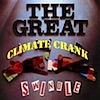 The old sea dog at the helm of our little flotilla of climate cranks has fired a broadside at the NIWA scientists involved in the preparation of this week’s revised climate projections for New Zealand. Yes, step forward Rear Admiral Jack Welch, who’s in fine bombastic form (perhaps he’s been taking lessons from Heartland’s J Bast Esq.) in a media release from the NZ CSC. According to Jack, “NIWA scientists have become political propagandists”:
The old sea dog at the helm of our little flotilla of climate cranks has fired a broadside at the NIWA scientists involved in the preparation of this week’s revised climate projections for New Zealand. Yes, step forward Rear Admiral Jack Welch, who’s in fine bombastic form (perhaps he’s been taking lessons from Heartland’s J Bast Esq.) in a media release from the NZ CSC. According to Jack, “NIWA scientists have become political propagandists”:
The State Services Commission should investigate whether scientists of NIWA have crossed the boundary into politics with their sudden flurry of advocacy for action on so-called global warming at a time when the Government is struggling to gain support in Parliament for its Emissions Trading Scheme Bill. This today from the chairman of the New Zealand Climate Science Coalition, Rear Admiral Jack Welch. “This flurry of advocacy has all the hallmarks of political spin, which has appalled the scientists associated with our coalition. Worse, NIWA is breaching the principles of good science by not qualifying its climate predictions with appropriate disclaimers.
Oh, the shock and the shame. Bow your heads, ye Nobel prizewinners, because the Admiral has spoken. He continues:
“Projections of future climate are not predictions, but speculation. They come from global climate models that have not been verified, so their output is merely conjecture. This is recognised across the Tasman, where the Australian CSIRO attaches a disclaimer to all its reports, such as this one on a report from the Queensland Government: ‘This report relates to climate change scenarios based on computer modelling. Models involve simplifications of the real physical processes that are not fully understood. Accordingly, no responsibility will be accepted by CSIRO or the Queensland Government for the accuracy of forecasts or predictions inferred from this report or for any person’s interpretations, deductions, conclusions or actions in reliance in this report.’
Unfortunately for the Rear Admiral, here’s what it says on page 2 of the report he’s complaining about:
As explained in the report, developing projections of future climate changes is still subject to significant uncertainty. The authors have used the best available information in preparing this report, and have interpreted this information exercising all reasonable skill and care. Nevertheless none of the organisations involved in its preparation accept any liability, whether direct, indirect or consequential, arising out of the provision of information in this report.
And a little bit later, in the executive summary (p xiii):
A definitive single quantitative prediction of how much a particular climatic element (eg, heavy rainfall intensity) will change over coming decades is not feasible. This is because the rate of climate change will depend on future global emissions of greenhouse gases, which in turn depend on global social, economic and environmental policies and development. Incomplete scientific knowledge about some of the processes governing the climate, and natural year-to- year variability, also contribute to uncertainty in projections for the future.
Seems to cover all of Jack’s points, and we haven’t even started reading the main body of the report (which is well worth reading in full).
Read The Flaming Report, Jack, before rushing to the media to complain about it. Sadly, I don’t think you bothered. I hope and expect that you will issue an equally speedy apology.
But I’m not holding my breath.




